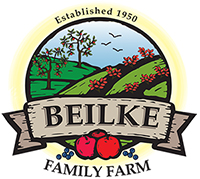Are We Organic?
We use some of the same crop protection products as organic growers but we do use non-organic sprays if necessary to protect the quality of our apples.
Being a farmer, the crops we grow are constantly vulnerable to bugs, diseases, weather that is too hot, too cold, hail and the list goes on. We have to walk the delicate balance between using organic products when possible and plant protection products for pests/disease that can ruin the apples to the point where customers wouldn’t want them. Later I talk about some cultural practices we use to minimize even having to use plant protection products.
Apple scab is a major disease here in the rainy Willamette Valley that can ruin apples. There are no organic sprays to prevent apple scab so we do spray during blossom time in the spring if the weather is warm and wet. Apple scab is a disease that can cause the apples to get brown lesions on the outside making the apples undesirable to the consumer. We do also take into account our cultural practices that reduce the chances of getting apple scab, like making sure apples on the ground get disintegrated bef and leaves are chopped up so they will break down quickly, since the leaves and apples can harbor the disease spores that cause apple scab.
To prevent worms in our apples, we discovered that using mating disruptors, which is an organic practice, is a great way to reduce the codling moth from laying eggs that cause worms in apples. Mating disruptors are little bands we hang in each tree. The bands let off a pheromone smell that only the codling moth can smell. Imagine it to be like a cloud of smell above the trees that the codling moth fly into. It confuses the males and female codling moths from finding each other so they can’t mate. Mating=eggs=worms in apples. It has worked great and has allowed us to reduce the use of bug protection products most years to one to zero sprays to prevent worms.
Apple skin can get burned just like our skin so if the temperature is going be nearing 100 degrees for several days, we put on calcium carbonate to protect the apples. If the apples get a bad sunburn, then that area will eventually just rot so the whole apple is no good. Calcium carbonate is an organic product and it is basically the same thing you taking when you eat a Tums or taking a calcium vitamin. But calcium can leave a white dusting on the apple and it can worry customers thinking it is a pesticide residue. So don’t be concerned if you see white on the apples some years you come to pick. It is non toxic and can be easily rubbed or washed off.
We continually strive to use the most soft of crop protection products if needed and learn about new organic products we can use.
Hope this gives a better understanding of what it’s like to be a farmer and what pests/diseases we have to fight against to grow a nice apple for our customers. We have to walk the delicate balance between choosing to use organic products where possible, plant protection products for when pests/disease can ruin the apples where customers won’t want them and to use best cultural practices to reduce pests and disease pressures to begin with.
And a fun fact, organic doesn’t mean “no spray.” Organic growers can use certain products that are on the OMRI (Organic Materials Review Institute) list.

